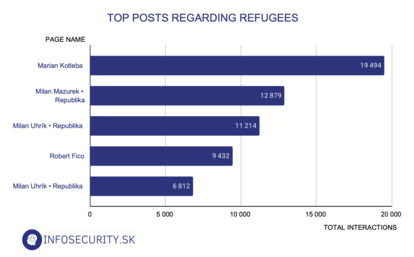DISINFORMATION
Slovak far-right politicians are spreading false narratives about refugees, the West is being blamed for the ongoing energy crisis

Infosecurity.sk presents an overview of disinformation trends that have been on the rise in information space in the past two weeks:
- Recently, a large number of disinformation actors and politicians, especially from far-right parties, began to spread false narratives about refugees crossing Slovak borders. Some say it is all part of a secret plot orchestrated by the European Union and Turkey.
- Another widely spread topic was the sanctions against Russia which are being tied directly to the ongoing energy crisis and energy costs in Slovakia. According to disinformation actors, the West is to blame.
- Various disinformation sources are also recycling old anti-western narratives. These include blaming the West for prolonging the war in Ukraine while simultaneously painting Russia as a pioneer of peace.
Refugees arriving in Slovakia spark a wave of disinformation and conspiracy theories
In the past two weeks, migration has been a hot topic among disinformation and far-right politicians in Slovakia. Citizens of Middle Eastern countries such as Syria and Iraq are fleeing war-affected areas and are using Slovakia merely as a transit country.
Marián Kotleba, a chairman of the far-right Kotlebovci-ĽSNS party, visited a tent city built on the Czech-Slovak border, which serves as temporary housing for refugees. In the video he posted on his Facebook page, Kotleba criticizes the Slovak government for its inability to protect state borders, as well as for “treating illegal immigrants way better than Slovak citizens”. In fact, refugees often arrive in Slovakia after months of travelling and don’t stay on the borders for more than four days.
This narrative of the government caring for other issues and forgetting about the needs of “ordinary citizens” has also been widely used in connection to the ongoing war in Ukraine. Over time it has become a way of scoring political points for many Slovak politicians.
In another video, this time posted by a ĽSNS affiliated hoaxer Mário Vidák, Kotleba also suggests that the waves of refugees arriving in Slovakia are a part of a “deliberate plan” to flood the country with immigrants. This video has been reposted by numerous disinformation media sources such as Hlavný denník or InfoVojna.
The aforementioned conspiracy theory about Slovakia being a victim of a secret foreign plot was also elaborated on by Andrej Danko, a leader of a political party Slovenská národná strana (Slovak National Party). He states that the high number of refugees arriving in the country is the result of a secret deal between the European Union and Turkish president Erdoğan.
In another post, this time through an official account of the party, Danko writes: “It is organised. The Turks have had problems with Syrian refugees for a long time. Now they are getting rid of them and they are miraculously crossing the border without any documents.”
Actors sharing this conspiracy theory have never provided any real evidence to support it. Most of them are basing their claims on a long-drawn-out debate about compulsory quotas and forced redistribution of immigrants among EU Member States, which has been widely misinterpreted.
Slovak Far-Right Politicians Shared False Narratives about Refugees
Since migration was one of the biggest topics in Slovak information space in the past two weeks, we also looked at it through an optic of a list of disinformation actors in Slovakia. We used the CrowdTangle analysis tool to analyze the most popular posts on Slovak Facebook that include the keywords “immigrants” or “refugees” (“imigranti” or “utečenci”). Posts were evaluated based on the total number of interactions (the sum of all reactions, comments, and shares).
As the data shows, the top 5 posts containing malicious narratives about refugees belong to politicians from Slovak far-right parties. The only exception is former prime minister Robert Fico. However, Fico, together with the SMER-SD party that he is a chairman of, has lately been showing signs of anti-system behaviour.

The first place belongs to the aforementioned Marian Kotleba, whose video visiting Czech-Slovak borders had accumulated over 270k views.
Milan Mazurek, a member of the Slovak parliament under the Republika party, claims that refugees residing in Slovakia pose a danger to the citizens. Using expressive rhetoric he is trying to induce fear of refugees as well as sow doubts about solidarity.
MEP (and chairman of Republika party) Milan Uhrík also pushes this narrative and compares the situation in Slovakia to “a ticking time bomb”. This labelling of immigrants as dangerous has no base in reality since the Slovak police have no record of any crime or offence committed by refugees.
Robert Fico posted a recording from his press conference where he blamed the Slovak government for the situation and called the director of the Migration Office “a Soros’ servant”. It is long-standing conspiratorial rhetoric tied to the attempt to hunt for secret forces or elites behind the scenes, which must be described as problematic due to the absence of any evidence.
Lastly, Milan Uhrík reposted a video of his speech in the European Parliament criticising EU policies in the fight against terrorism. He claims that Brussels wants to eliminate extremism through “internet censorship”, but should instead deal with illegal immigrants arriving in the EU, since “we do not know how many of them are former terrorists, jihadists or criminals”. This rhetoric is harmful in many ways since it portrays all refugees as a potential risk to European security.
Energy crisis as a result of the West’s poor policies
Although false narratives concerning the ongoing energy crisis are not a new topic among disinformation actors in Slovakia, they began re-emerging in the past two weeks.
Pro-Kremlin propagandists are still trying to question the effectiveness of sanctions against Russia to undermine Western actions. MEP Milan Uhrík calls the sanctions “suicidal” and is trying to push the disinformation narrative that by imposing them, Western countries are not punishing Russia, but merely their own citizens.
In another post, he goes as far as to suggest that the United States is responsible for the sabotage of the Nord Stream pipelines and therefore for deepening the energy crisis. Spreading such a serious claim is highly problematic, given that there exists no evidence of Western involvement in the explosions.
Uhrík also suggests that the motivation behind the sabotage is to sell Slovakia gas that is reportedly 3 times more expensive than from Russia. A similar narrative was also shared by Badatel.net, which is well-known for spreading dangerous conspiracy theories. The Facebook post mockingly asks: “Why did our enemy Russia sell us gas cheaply and our ally the US sells us gas 6 times more expensive than on their domestic market?”
A pro-Russian page Armáda Ruskej Federácie (Army of the Russian Federation) claims the sanctions against Russia are not working and the EU is responsible for the spike in energy costs. Similar false information was repeated by InfoVojna in their recent article stating that the Green Deal is the main reason for the current high costs, not the war in Ukraine.
Recycling old anti-western narratives
We have detected several disinformation narratives concerning the war in Ukraine, which constantly circulate in the Slovak information space.
Many disinformation actors are still blaming the West for the ongoing war. Regarding this particular topic, an article by Hlavný denník was re-shared several times. It quotes Russian Foreign Minister Sergei Lavrov claiming that the Kremlin could be ready to negotiate an end to the Ukrainian war if the West meets certain conditions. These include Ukrainian neutrality and halting the enlargement of NATO. The goal of this article is to paint Russia as the peaceful party while portraying the West as unwilling to participate, even though it was the Russian troops that invaded a sovereign country.
It is also important to state that the adoption of political statements of the Russian officials by disinformation sources has been a growing trend in the Slovak information space (as well as globally) for the duration of the war.
Opposition MP Ľuboš Blaha is currently banned on Facebook (due to repeated violations of Meta's rules regarding hate speech, bullying and harassment, inciting violence, as well as disinformation) but continues his activity on Telegram. There he claims that the US is artificially prolonging the war and sponsoring “the Zelensky regime”. According to him, the US does not want peace because it is profiting off of the conflict.
NATO also seems to be a stable topic among disinformation actors in Slovakia, who did not hesitate to spread old recycled narratives about the organization.
The same narrative was further pushed by the Russian Embassy in Slovakia claiming that “the Western countries support the escalation of the conflict in Ukraine. The Ukrainian armed forces are constantly being massively supplied with modern weapons and ammunition, NATO provides them with intelligence, conducts direct targeting, sends its military advisers, and supplies the Ukrainian armed forces with foreign mercenaries..”
Armáda Ruskej Federácie (Army of the Russian Federation) points to NATO’s involvement in other international conflicts and mockingly states: “When NATO bombs a country's critical infrastructure, it is not about war crimes but about peace and love”. The post has since been re-shared over 1.3k times.
Project Infosecurity.sk organized by Adapt Institute, which is supported by the Prague office of the Friedrich Naumann Foundation for Freedom, continuously monitors the activities of both Slovak and foreign disinformation actors, but focuses mainly on the former. The project activities are built upon daily monitoring of emerging disinformation, hoaxes, and conspiracy theories in the online information space. This approach allows the analysts to identify disinformation posts and narratives that resonated with the public the most, as well as to find out where they originated, and how they spread and evolved on social media. The report takes the form of a bi-weekly summary of arising trends in the spread of malicious information content online. Based on that, Infosecurity.sk can warn the public about emerging and current trends in the field of disinformation, manipulation, and propaganda

